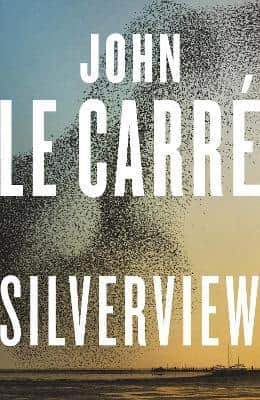Book review: Silverview, by John le Carré


There is a characteristic John le Carré scene in Silverview in which Stuart Procter, a member of the Secret Intelligence Service, visits two former colleagues, a long-married couple now retired, in order to trawl over the past and the career of a former highly regarded agent, Florian, who is now suspect. Towards the end of the scene, the husband, incapacitated by a stroke, says “between ourselves – don’t tell your trainees or you’ll lose your pension – we didn’t do much to alter the course of human history, did we? As one old spy to another, I reckon I’d have been more use running a boys’ club. Don’t know what you feel...”
Procter, who also often goes by the name of Pearson, makes no reply, but one can’t help wondering whether, after 60 years and 26 novels, this may be le Carré’s own judgement: that the secret services have often done much harm and little good. Of course, even if it is, his fascination with them and their operation in dark places remains lively and, indeed, from the early days of Call for the Dead and The Spy Who Came in from the Cold he was alert to the moral ambivalence of the secret world and its inhabitants.
Advertisement
Hide AdSilverview is, alas, his final word, his last novel written in the year before his death a year ago. Frankly, since it has a freshness, despite much that is familiar, which is remarkable for an author on the brink of his tenth decade and within sight of death, one would not be surprised if told that it was written some time ago. Yet it appears it wasn’t, and it seems to me his best novel since A Most Wanted Man, published in 2008.


The novel begins with a young woman, Lily, with her son in a push-chair, calling at a London house to deliver an envelope, requiring an oral reply. We then turn to a bleak, rain-swept seaside town in East Anglia, where Julian, having abandoned a very successful career as a City trader, has opened a bookshop. An elderly, white-haired man wearing a mackintosh and old-fashioned Homburg hat, calls on him, making conversation and suggestions, but buying nothing. This is Edward Avon, also known as Edvard, Ted and Teddie. He has courtly manners, as old-fashioned as his hat. Is he a bore, an eccentric or what? No matter, he is likeable, but also a mystery. He claims to have been school friend of Julian’s eccentric father. He is married to Deborah and lives in a mansion, Silverview. Debbie is dying of cancer and they are on poor terms. We soon learn that Debbie has been, still really is, high-up in the Service, that Lily is their daughter, that Edward makes long telephone calls from a café run by a Polish woman, and that he has no computer but uses one belonging to a woman who owns what used to be called a curiosity shop, and now asks to use Julian’s.
That’s the set-up, and you would have to be a dull reader – or one new to le Carré – not to sense with quickening interest and even apprehension – where it is heading, not to sense that Edward has a rich and also painful past, and soon that he is that classic le Carré figure, the battered but never beaten idealist who is suspected of having turned rogue and is now seen as a black sheep that has strayed from the flock.
The pace of the novel is beautifully judged. As ever, le Carré moves between now and then, much of the narrative coming in conversations retrieved from the past, from Poland in the Cold War and Bosnia in the terrible break-up of Yugoslavia. There is just enough of the familiar tradecraft, most centred on Proctor, amiable, sympathetic, yet bound to duty. As for Edward, Tennyson got him taped before le Carré wrote him: “His honour rooted in dishonour stood, / And faith unfaithful kept him falsely true…”
Nabokov, in his Lectures on Literature, told readers to cherish the details. Le Carré was always a master of detail, and there are cherishable details galore here. It is, I suppose, a sunset novel, but what a glow it leaves in the evening sky.
Silverview, by John le Carré, Viking, 208pp, £20
A message from the Editor:
Thank you for reading this article. We're more reliant on your support than ever as the shift in consumer habits brought about by coronavirus impacts our advertisers.
If you haven't already, please consider supporting our trusted, fact-checked journalism by taking out a digital subscription at https://www.scotsman.com/subscriptions